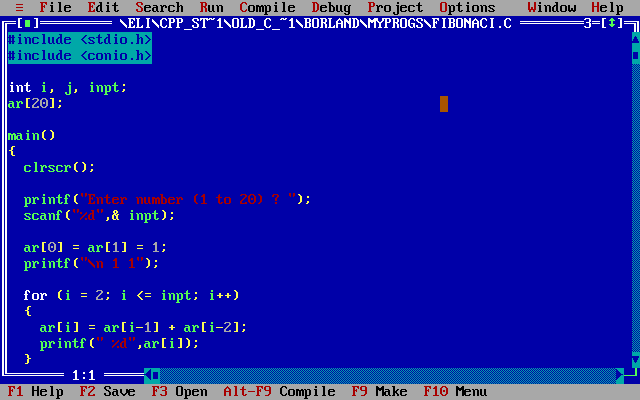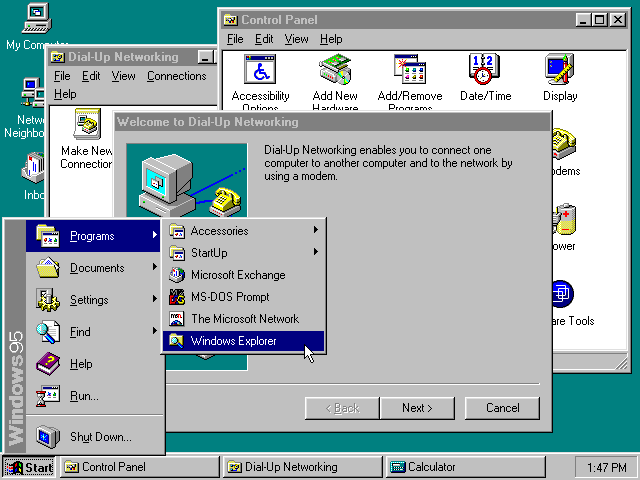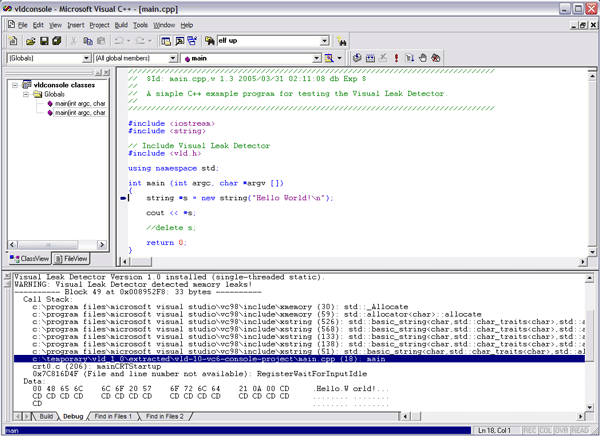The history of IT with my eyes

Starting as a developer at the then advanced IDE from Borland, bc ++ 3.11, running on the DOS operating system, which then lacked everything - this is the support of dos4gw (which came out, if my memory serves me, a couple of years later), I I loved this IDE and it seemed to me that anything could be done on it. There was a bunch of drivers that were written by enthusiasts, changing console fonts, encoding, there was a whole system of working with memory ... The breakout was dynamically loaded libraries to disk, created to put everything into memory. Segments (well, modern programmers, what are RAM segments, and where does 640K come from?), Lower memory, upper memory ... 640 kilobytes ... People invented new tasks for computers, and geniuses of their work invented them. And in fact, in fact, it was not so long ago ... It was almost yesterday.

Then fate led me to the development for Windows and I had difficulty with these messages, message queues, but then I got used to it, and programmed for this platform. The technology spurt was super fast. Five minutes ago we were working under the real mode of the processor, and it seemed to us that such a control as a window is a rather resource-intensive task, which would seem rather incomprehensible how to solve. But now it was remembered as kids playing on the playground. Protected processor mode. I bow to Microsoft programmers. They have developed a truly brilliant creation. Think about technology breakthrough in programming between Windows 3.11 and Windows 95. This is not just a buggy OS, as many people remember. This is a breakthrough. Protected mode of the processor, paged memory addressing, isolated space for each process, virtual memory. The technology DLL started its movement (yes, it was a DLL hell, but try to do as much as one release), COM, a new driver system ... The main thing is a thoughtful driver system ... Plug'n'Play ... The introduction of 32-bit disk access in Windows 3.1 allowed avoid using BIOS to manage hard drives. And ... Multitasking. Browsing the Internet in a browser. It didn’t fit in my head, how much was developed, and how much I had to study ... (Learn ... heh ... how much it was developed ... We were looking for possible architectural solutions, put it off, coded, without having normal debugging tools for multi-tasking applications). Progress pulled forward a rocket. There were pessimists who predicted the death of the system, and the resurrection of MS DOS, but this is rather a conservative grumble in front of a new, unknown. Technology exploded, and we got Windows 98 (I, unfortunately, is not strong in the Linux part, and I am sure everything was just as revolutionary on that front !!). It felt !!! Children, it was felt by each cell of a nature !!! We live during the technological revolution !!! C ++ seemed like a genius idea. This is a language with which you can perform mindless things ... And, only after years of development, you can feel the guru of this language ... And then they will come to you and show you another piece, and you feel that you still do not fully know its capabilities.

Opportunities that were previously used by scientists ... Were in the hands of ordinary citizens (having grandmas to the computer). If earlier it was necessary to have at least a candidate’s in order to program on powerful computing complexes, now every schoolboy could write saytik in the PHP scripting language.
I switched to developing a Ruby programming language. Oh, this syntactic sugar of this beautiful language !!! I was captured in the heart! Heavy for C ++ constructions turned into something cloud-like when you move, for C ++ it is immovable, with the effort of a little finger. Automatic garbage collection, iterators, truly flexible language. All this made me a fan of this programming language. I have not used PHP, and I think it is also superb and simple ... But Ruby ... I'm a fan of it. I knew before the line the source code of this interpreter. Progress did not stand still and I did not have time to look around when the public version was shown the next version of the .NET Framework, and Borland, the idol of a whole generation ... Something happened to it in general ... They followed the IDE for ultra-fast software development ... But they were ahead of their time ... They should have stayed and continued to make competitors of MS Visual Studio as part of programming ideology at a low level ... Who knows, maybe now we would be happy about the release of Borland C ++ 2015, not MS VS 2015, but in general, it’s easy for me to talk here sitting in a chair and studying the finished ... Think I (ehhh) something qb innovative ... But try to prove to people that it - what they need! As a result, Delphi passes from hand to hand, they don’t know how to get rid of it, and the latest version, which I decided to look at in 2010, didn’t please me at all ... Nothing remained of it. With ++ Builder in general, it is not clear what is wrong with it. Meanwhile, Microsoft was advancing with its new offspring - the .Net Framework, the flagship programming language C #, and, actually, the CLR.
')

Whatever you say ... Here's how you do not scold me for the praises ... But in fact, I admire not Microsoft itself, but the people, minds who invented it all. Those who write in C ++ will understand me. I remembered Ruby. This syntactic sugar code. YES! We no longer think about the leakage of printf, strcpy, and other functions that just didn’t scream: I’m HERE !!! HACKING ME DOWN TO SPLIT !!! (By the way, what am I talking about? :)) We don’t think about wchar_t, WideCharToMultiByte (do you know that Asian languages are encoded with a variable number of bytes per character? Count the length of the string ...). This text is a jumble of memories ... But this jumble is the result of the fact that we are sitting and only have time to keep up with the products of the companies. Learn new technologies. Meanwhile, brilliant minds create the future. And this programming ... I am silent about microprocessors, motherboard, graphics ... Progress rushing like a rocket, forward and only forward ... developing new languages ... Platforms, clouds ... Let us do absolutely anything ... Without leaving home ... Well, only if you buy yourself to eat
Thanks to all those who created this profession.
Source: https://habr.com/ru/post/97897/
All Articles